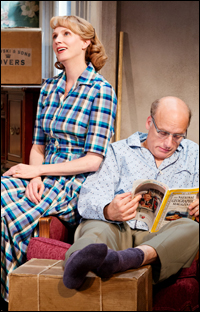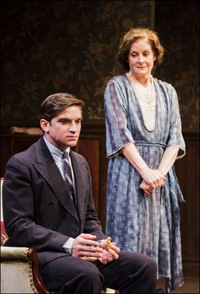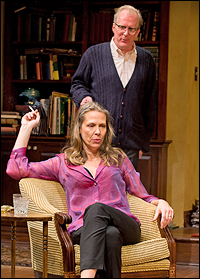
*
Director Pam MacKinnon has been toiling exclusively with the Pulitzer Prize pedigree since she joined this club two years ago by way of Clybourne Park.
Bruce Norris' pitch-black comedy about race and real estate in that Chicago suburb world-premiered Off-Broadway at Playwrights Horizons under her direction March 21, 2010, and will end its run on Broadway Sept. 2 at the Walter Kerr.
Separating this six-block transfer were sold-out, critically cheered runs in London and Los Angeles, the aforementioned Pulitzer and 2012's Tony Award for Best Play.
And through it all, the seven-member cast has stayed almost entirely intact. "It's really unusual that we kept the company together as long as we did," she noted. (The Off-Broadway/Broadway troupe did not play London.) But directors, once their "work is done here," flit off in other directions, and MacKinnon has been conspicuously selective about where she landed, settling first on a Steppenwolf Theatre Company revival of Edward Albee's Who's Afraid of Virginia Woolf?, which didn't win the Pulitzer in 1962. The language that warring marrieds make "walking what's left of our wits" — practically quaint by today's standards — shocked the Pulitzer judges into total silence that year, but they subsequently snapped out of it and awarded Albee three of their make-up Pulitzer Prizes.
| |
 |
|
| Christina Kirk and Frank Wood in Clybourne Park. | ||
| photo by Nathan Johnson |
These three plays are her first Foote steps ever, "but I'm completely hooked," she confessed, and she's thankful for the added edge of having on board the playwright's daughter, Hallie Foote (a Tony contender and Richard Seff Award winner for Dividing the Estate). "She was an actor in two of the plays here, and I leaned on her a little more than maybe I would normally. Out of a cast of nine, three or four had done a number of Horton Foote plays before. And Jayne Houdyshell, who hails from small-town Kansas, said it felt very easy for her to slip into this rural ambience.
"We had a pretty long preview process, and we rehearsed throughout it. Every day, new stuff seemed to get revealed. What at times smacks of exposition can be really owned by these people because they're storytellers. Even if they've told the story before, they're telling it for a very emotional, grounded reason. It's rich material. The tones of the plays are so varied, so complicated. There's delicious ambiguity to go from a commedia kind of stock-character humor of Blind Date to something very violent and devastating in One-Armed Man, then combine the two in Midnight Caller. It's very good fare to have an evening like that."
| |
 |
|
| Evan Jonigkeit and Hallie Foote | ||
| Photo by James Leynse |
For that matter, for all the sturm und drang in Virginia Woolf, there's a silver lining of lightness, MacKinnon contended. "I think audiences will be amazed at how much they laugh," she said. "The marriage between George and Martha, between Tracy and Amy on stage, is a palpably complex relationship. With this production, we're really honoring the three-act structure. The fact that Act One is called Fun 'n' Games means that there's a real lightness to it. Then gradually, gradually, gradually, as the party starts to turn, layers are removed, and we find The Truth."
The author personally put up some signposts early on. "Edward came to Chicago early in rehearsal and gave us notes about shoring up the third act — and then came to DC shortly after it opened and just really had high praise for the production.
| |
 |
|
| Carrie Coon in Who’s Afraid of Virginia Woolf? | ||
| photo by Michael Brosilow |
The three-stop process of bringing the play to Broadway by way of Chicago and Washington has benefited the performances, she felt. "It just got deeper as far as what the actors can bring to the table. It's so vivid, both in terms of being a three-act play and also just emotionally. It just keeps on revealing itself. We opened in Chicago really strong, and, in the interim, I went away and did Death of a Salesman while they were running it. Then, I came back, and especially Amy Morton had just grown roots as Martha, so, by the time we closed in Chicago, the range exceeded my expectations. Then, in DC, we took another step. It has been very gratifying."
| |
 |
|
| Amy Morton and Tracy Letts | ||
| Photo by Michael Brosilow |
Some critics have said that, with this production, it finally becomes George's play. "Well, I think it is George's play on the page," MacKinnon conceded. "George is the engine in the play in Act One and Act Two. Then Martha comes on stage — I wouldn't even say she's an engine, but she's alone on stage and then talks at Nick for a while. Then George returns and he's the engine again. There are been some great, great ladies who've played Martha. I think it's sort of unfortunate because there aren't that many huge roles for women in their early 50s. We look at Martha as 'Omigod! It's that role,' but actually it's George. He definitely lurks in the shadows and on the periphery, throwing barbs from the side of his mouth instead of direct-on shots."
It has to be noted that Letts had a head start on the role, having done it eight-plus years ago at the Alliance Theatre in Atlanta, opposite the late Margo Skinner. Nor is this Morton's first time at the rodeo: she directed them in the production.
So what was it like directing a former director of this marital battlefield? A breeze, insisted MacKinnon. "I've known Amy for a long time. We've actually never worked together before, but we've had a lot of mutual friends. For her, it was an even more distant memory than it is for Tracy. When she's allowed to just act, that's what she's focusing on. She knew the role of Martha was a mountain, and she handed the reins over to me as far as director goes. I never got a whiff of regret."
MacKinnon's secret weapon is the history her two Steppenwolf stars have amassed over the years. "That's really great and, I think, shows up on stage. They have played opposite each other over a span of 23 years and quite often get cast as husband and wife. They've really grown up together on stage, which shows up in a performance. You don't have to create a backstory or emotional complicatedness. Certainly, what I've found working at Steppenwolf a couple of times — because it is such a tight theatre community — the emotional-psychological-personal history between actors is rich."











